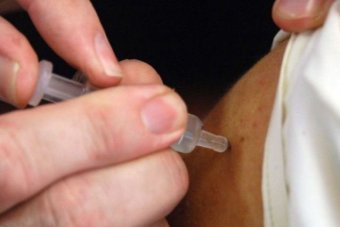A large outbreak of mumps in Western Australia has been blamed for a big increase in the number of cases Australia-wide, and has led to criticism of the state’s vaccination rates.
More than 390 cases of mumps have been reported around WA since March, compared to about 20 cases at the same time last year.
Across Australia, there have been 500 more cases of the viral infection this year compared to last, with WA accounting for almost three quarters of that spike.
The WA Health Department said the outbreak was mainly confined to remote Aboriginal communities in the north of the state, and to some people returning from overseas.
A spokeswoman said there had also been a small number of cases in Perth, but said there was no need for concern and added the department had not issued any health warnings.
“There have been a number of ‘clusters’ this year, mainly in the north of the state,” the spokeswoman said in a statement.
“Around 15-25 cases are currently being notified each week, mostly from the Pilbara, Goldfields, Kimberley and Midwest regions.
“A few apparently sporadic locally acquired cases have been diagnosed in the Perth metropolitan area in the past fortnight.
“At present, there is no wider public health risk.”
Vaccination programs lax: AMA
Australian Medical Association WA president Michael Gannon accused the Health Department of playing down the problem.
“I’m sure they would be concerned. Mumps is a very serious infection,” Dr Gannon said.
“We have seen a significant increase this year and this is [caused] very simply by people failing to avail themselves of the MMR vaccine to prevent it.
“We are getting lax with vaccination programmes. We have consistently over the past 10 or 15 years lagged behind many other states with childhood vaccinations.
“I’m pleased to report that they are back above 90 per cent, but for many years we had vaccination rates of 85 to 90 per cent.”
Dr Gannon agreed with the Health Department that the outbreak had started in remote communities in WA’s north, saying it had spread south and into two private boys’ schools in Perth.
“There was an outbreak in the Kimberley earlier this year and then an outbreak in a couple of major centres in the Pilbara, and then outbreaks in two of Perth’s bigger boarding schools,” he said.
“The problem is when infections like mumps, highly infectious viruses, get into closed spaces like nursing homes and boarding schools, they can spread like wildfire unless people are vaccinated.”
Dr Gannon urged parents to ensure their children were vaccinated against mumps and to ensure they followed up with booster shots when their children became teenagers.
“We should always be concerned about outbreaks of vaccine-preventable infections,” he said.
“Mumps is one of the more benign preventable infections, but it has the ability to make people feel very sick. It has a clear association with male infertility. We shouldn’t see these cases.”

